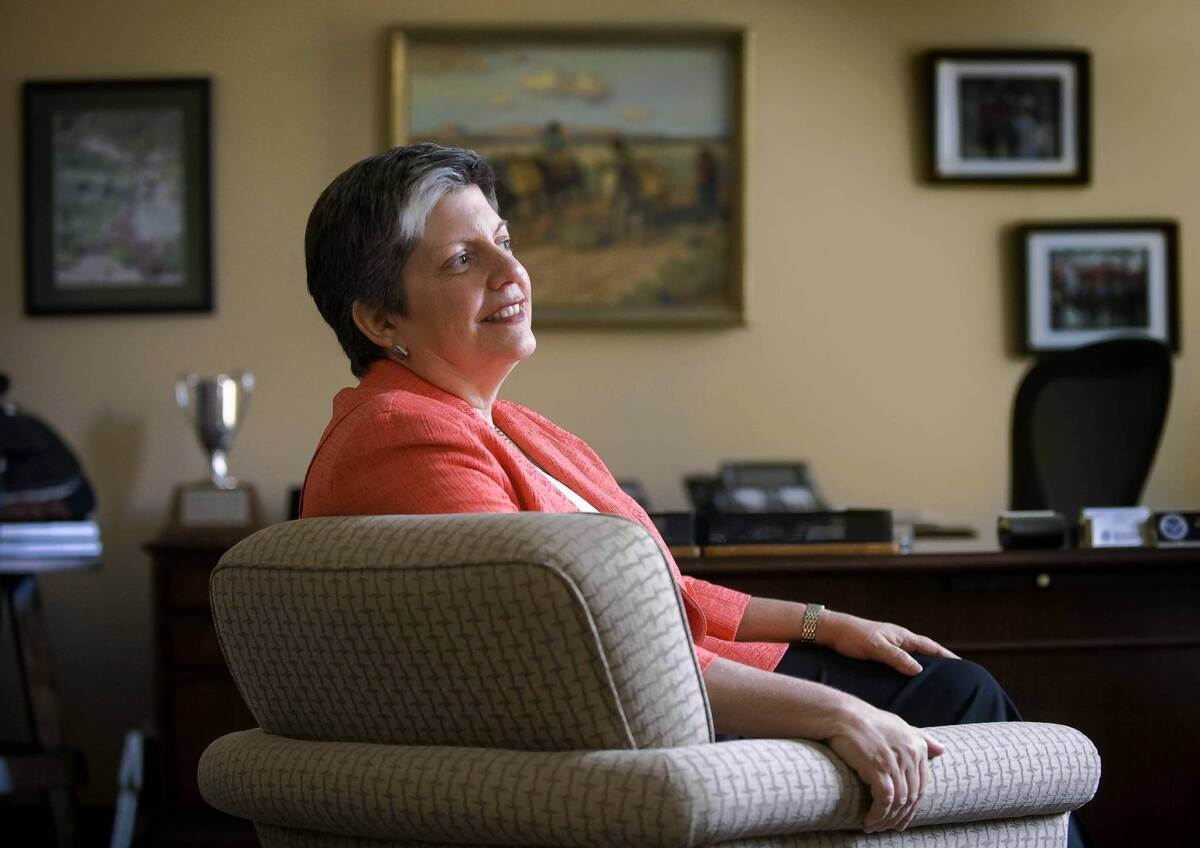Janet Napolitano steered an unwieldy Homeland Security Department

- Share via
WASHINGTON — With a folksy smile and razor-sharp political instincts, Janet Napolitano managed to wrestle the federal government’s third largest and arguably most dysfunctional U.S. department into relative shape during her 4 1/2 years as secretary of Homeland Security.
She thus gives up one vast but troubled empire for another when she leaves Washington to take over as president of the University of California system in September.
As head of a department cobbled together from 22 disparate agencies and departments after the Sept. 11, 2001, attacks, Napolitano regularly took flak from across the political spectrum. But she retained the strong support of President Obama, who thanked her Friday for “outstanding” work and praised her “judgment and advice.”
“Since Day One, Janet has led my administration’s effort to secure our borders, deploying a historic number of resources, while also taking steps to make our immigration system fairer and more consistent with our values,” Obama said in a statement.
The Department of Homeland Security has more than 240,000 employees focusing on sectors including aviation, border security and cyber-security.
An original member of Obama’s Cabinet, Napolitano was praised for restoring the Federal Emergency Management Agency to good standing after its disastrous response to Hurricane Katrina in 2005 during the George W. Bush administration.
Obama thanked Napolitano for working “around the clock” to respond to natural disasters, including the 2011 tornado in Joplin, Mo., and Hurricane Sandy last year in the Northeast.
But her legacy is “decidedly mixed,” said Marshall Fitz, director of immigration policy at the Center for American Progress, a liberal think tank in Washington.
“She inherited a battleship already firing away and pointed in one direction, and she tried to steer it in another,” said Fitz. “It’s a thankless job.”
Under Napolitano, authorities imposed far more intrusive screenings of passengers at airports, and deported a record number of undocumented immigrants. She also created a program to give limited legal status to teens and young adults who were brought to the U.S. illegally as children.
The country suffered one major terrorist attack on her watch when two homemade bombs exploded April 15 during the Boston Marathon, killing three people and injuring more than 260.
It turned out that customs agents hadn’t notified the FBI that one of the alleged bombers, Tamerlan Tsarnaev, had returned from Russia even though the FBI had investigated him for suspected terrorist ties.
Two other plots that were potentially far more deadly — an attempt to bomb a Northwest Airlines passenger jet over Detroit on Christmas Day 2009 and an attempt to set off a large car bomb in Times Square in May 2010 — both failed because the bombs fizzled.
Napolitano was heavily criticized for saying “the system worked” after the Detroit case, even though a Nigerian man was able to board a U.S.-bound flight with a bomb in his underwear. Napolitano later apologized, admitting the screening system had failed, and pushed for more sharing of terrorism data on foreigners applying for visas.
Napolitano shut down plans to build a $1-billion high-tech fence on the southwestern border, and insisted it be replaced by less expensive off-the-shelf technology.
But reports by the Government Accountability Office, the investigative arm of Congress, repeatedly found waste and abuse in acquisition programs.
Efforts to help towns ravaged by hurricanes, tornadoes and other natural disasters improved, especially compared with the previous administration’s response to Hurricane Katrina. And Homeland Security generally got high marks for assisting people, fisheries and the environment after the massive BP oil spill in the Gulf of Mexico in 2010.
People close to Napolitano said she had hoped to succeed Atty. Gen. Eric H. Holder Jr. But they said when the possibility of leading the University of California system came up, she decided to take it.
Napolitano would be the first woman to run the 10-campus UC system. Her father was previously the longtime dean of the University of New Mexico School of Medicine. Napolitano served two terms as governor of Arizona, from 2003 to 2009, during which she broke the state record for vetoing bills, issuing 180 vetoes to the Republican-held Legislature.
U.S. Rep. Michael McCaul (R-Texas), who chairs the House Homeland Security Committee and has often sparred with Napolitano, said Friday that Obama should appoint “someone who does not underestimate the threats against us.”
“Ten years after the creation of the department, it is critical that its mission isn’t undermined by politics or political correctness,” McCaul said in a statement. “The border is not secure, and the threat of terrorism is not diminishing.”
It was not clear who would replace her. Officials said possible replacements included Sen. Susan Collins (R-Maine); former Sen. Joe Lieberman; retired Coast Guard Adm. Thad Allen; New York Police Commissioner Raymond Kelly and former Washington Gov. Chris Gregoire, who has been considered for posts in the past.
Times wire services contributed to this report.
More to Read
Sign up for Essential California
The most important California stories and recommendations in your inbox every morning.
You may occasionally receive promotional content from the Los Angeles Times.














